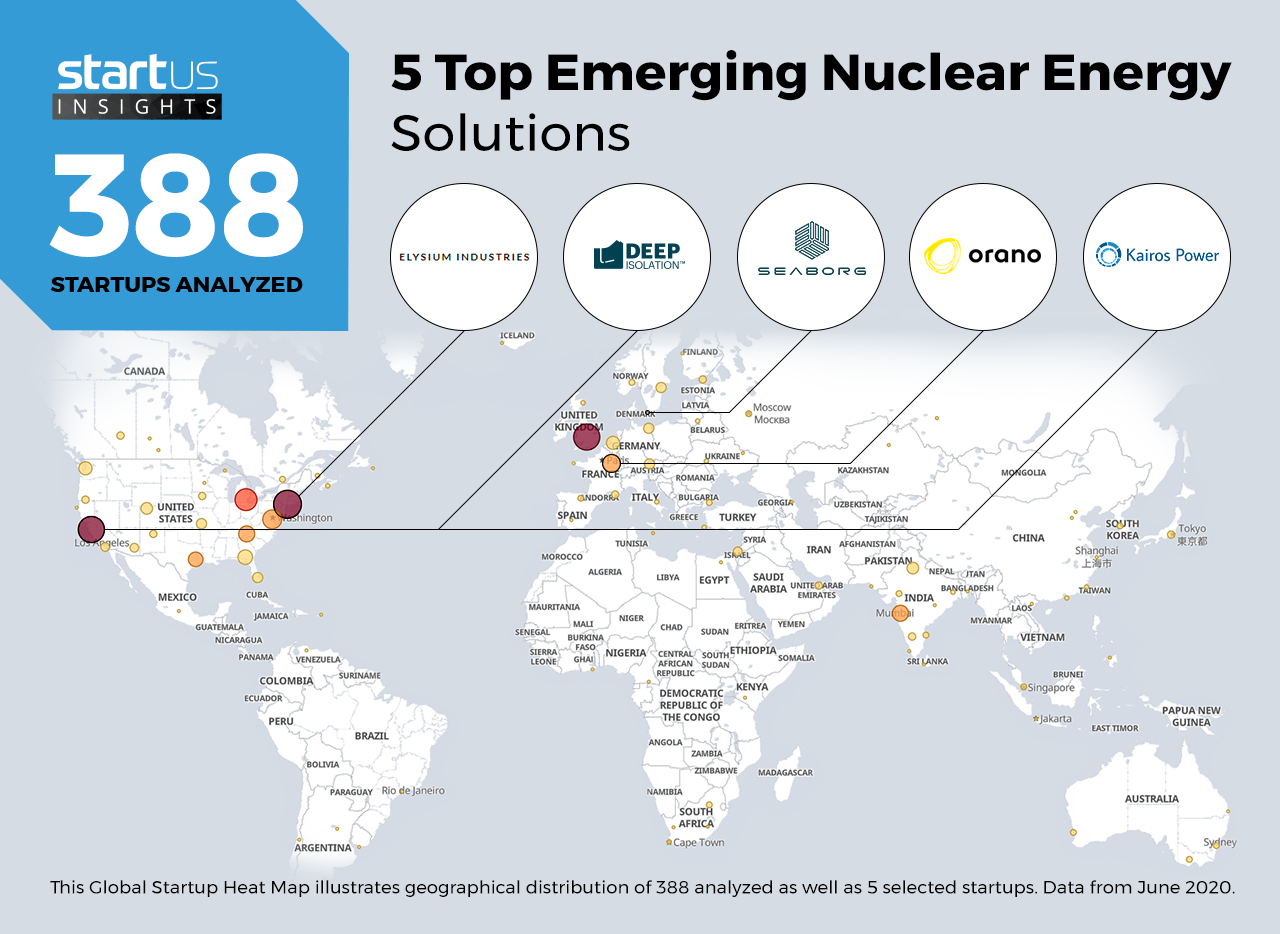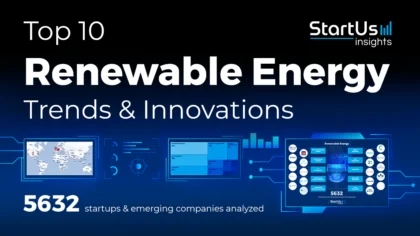Our Innovation Analysts recently looked into emerging technologies and up-and-coming startups working on solutions for the energy sector. As there is a large number of startups working on a wide variety of solutions, we want to share our insights with you. This time, we are taking a look at 5 promising nuclear energy solutions.
Heat Map: 5 Top Nuclear Energy Solutions
Using our StartUs Insights Platform, covering 1.116.000+ startups & emerging companies, we looked at innovation in the field of energy. For this research, we identified 388 relevant solutions and picked 5 to showcase below. These companies were chosen based on a data-driven startup scouting approach, taking into account factors such as location, founding year, and technology among others. Depending on your specific criteria, the top picks might look entirely different.
The Global Startup Heat Map below highlights 5 startups & emerging companies developing innovative nuclear energy solutions. Moreover, the Heat Map reveals regions that observe a high startup activity and illustrates the geographic distribution of all 388 companies we analyzed for this specific topic.
Kairos Power – Low-Pressure Fluoride Coolant High-Temperature Reactor
Nuclear energy is currently treated as a double-edged sword. While its benefits are potentially far-reaching, the potential drawbacks of any mishap also have severe consequences. However, it is widely acknowledged that nuclear energy will be needed to meet climate goals for many countries. Startups and emerging companies work to develop solutions that, essentially, reimagine every aspect of a nuclear reactor to build them with higher levels of safety and lower levels of risk.
US-based startup Kairos Power develops an advanced reactor technology that leverages TRI-Structural ISOtropic (TRISO) fuel in pebble form in combination with a low-pressure fluoride salt coolant. The technology uses an efficient and flexible steam cycle to convert heat from fission into electricity to complement renewable energy sources. By replacing the use of water with molten fluoride salt as coolant, these reactors eliminate the need for massive containment structures.
Seaborg Technologies – Compact Molten Salt Reactor (CMSR)
Many nuclear energy technology companies focus their efforts on reducing the complexity of building and operating nuclear power plants. This requires dramatic reductions in the size of such plants along with various changes to the different important components, such as coolant, base fuels, and control rods. Furthermore, the molten salt liquid is proving to be a promising innovation in the industry as it ensures the reactor does not become too hot to explode. Based on this vital safety feature, we observe emerging companies developing innovative housing technologies for nuclear as well.
Danish startup Seaborg Technologies develops compact molten salt reactors. Conventional nuclear reactors have solid fuel rods that need constant cooling using water, under high pressure. In the CMSR, the mixing of fuel with liquid salt acts as a coolant. This ensures continuous cooling capabilities and eliminates the chance of a meltdown or explosion. Moreover, the reactors will simply shut down by themselves in the case of an emergency. The importance of this is not only safety but also a significant reduction in complexity and cost.
Elysium Industries – Molten Chloride Salt Fast Reactor (MCSFR)
The biggest challenges that have held back the rapid deployment of nuclear energy has to do with nuclear waste management. Dumping nuclear waste, which contains harmful radiation, into the sea or under concrete slabs remains unpopular and even expensive. Conventional nuclear technology is also inefficient at utilizing base fuels, resulting in costly losses. Further, small human operator errors can lead to significant damages. The use of molten salt as the reactor coolant provides startups with several opportunities to develop the most efficient nuclear energy system.
The US-based company Elysium Industries develops molten chloride salt fast reactors. This reactor is capable of providing base-load and clean power while addressing the current issues in the nuclear power industry. Additionally, MCSFR converts spent nuclear fuel and weapons waste by transforming it into useful energy. The Elysium MCSFR utilizes existing code-qualified materials and relies on natural processes. Elysium Industries looks to simplify engineering systems and save costs by employing natural techniques for passive operation and safety.
Deep Isolation – Nuclear & Radioactive Waste Disposal Technology
While emerging nuclear reactor solutions aim for future development and benefits, several startups are working on the best ways to handle the problems associated with conventional nuclear power. About one-third of the current nuclear waste is stored in dry casks above ground at the nuclear reactor sites. This is considered to be interim storage and there are no licensed locations yet for the long-term disposal of nuclear waste. As a result, this becomes a major factor that prevents the large-scale adoption of nuclear power.
The US-based startup Deep Isolation develops a nuclear waste and radioactive waste disposal system. By leveraging directional drilling expertise the spent nuclear fuel and high-level radioactive waste are isolated in horizontal drill holes, located underground in suitable rock formations. The repository begins with a vertical access drill hole extending thousands of feet deep and will then gently turn horizontal where the nuclear waste is stored in canisters. This solution is capable of storing 5 years of waste from a Boiling Water Reactor (BWR) and 11 years of waste from a Pressurized Water Reactor (PWR). Moreover, the sites can be located at, or near, the power plants to minimize transportation.
Orano – Nuclear Fuel Cycle Management
Nuclear power generation requires support from the government and industry to successfully generate energy. Also, dismantling and decommissioning nuclear power plants require a massive logistics effort, apart from reactor safety precautions and nuclear waste management. As various governments allow for private innovation and operations of some of these segments in the life of a nuclear plant, we observe significant improvements to quality and safety in maintaining and managing nuclear power facilities.
The French company Orano Group was founded as a result of the French government reducing their control over certain aspects of nuclear energy. Orano is focusing its attention on the recovery of nuclear materials and the management of nuclear waste to generate safe, low-carbon electricity. With significant expertise in the nuclear fuel cycle, they offer customers tailor-made solutions for every stage of nuclear power generation, from mining, conversion, enrichment, recycling, logistics, and engineering to decommissioning and dismantling.
What About The Other 383 Solutions?
While we believe data is key to creating insights it can be easy to be overwhelmed by it. Our ambition is to create a comprehensive overview and provide actionable innovation intelligence so you can achieve your goals faster. The 5 nuclear energy solutions showcased above are promising examples out of 388 we analyzed for this article. To identify the most relevant solutions based on your specific criteria, get in touch.



![Dive into the Top 10 Energy Industry Trends and Innovations [2025]](https://www.startus-insights.com/wp-content/uploads/2025/03/Energy-Trend-SharedImg-StartUs-Insights-noresize-420x236.webp)






